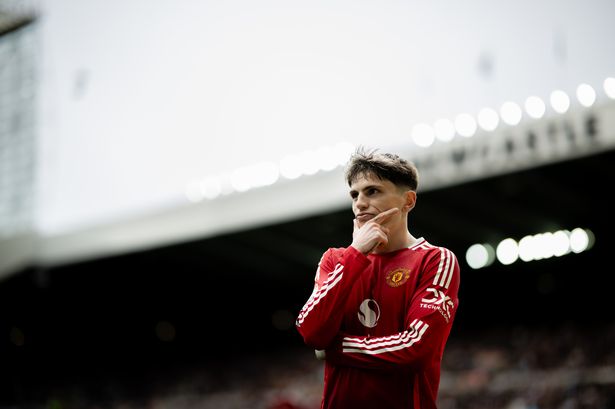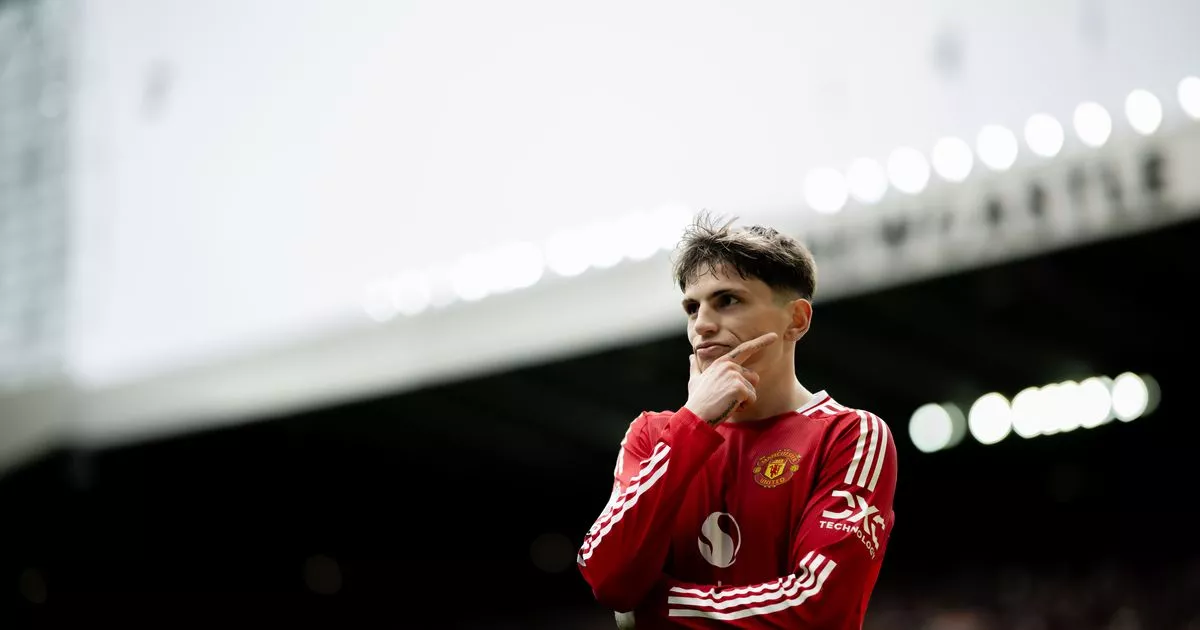Chelsea are interested in signing Manchester United’s wantaway winger Alejandro Garnacho Chelsea are intensifying their efforts to sign Alejandro Garnacho from Manchester United(Image: Ash Donelon/Manchester United)
Chelsea are intensifying their efforts to sign Alejandro Garnacho from Manchester United(Image: Ash Donelon/Manchester United)
On the cusp of spending £75m to land Benjamin Sesko from RB Leipzig, and having already signed Matheus Cunha and Bryan Mbuemo for a combined £132.5m, Manchester United have not been shy about spending this summer.
While the ability of a side that finished last season in the Premier League fifth from bottom, and has no lucrative European football to look forward to this coming season may have been questioned by rival fans, the explanation is a pretty simple one.
Manchester United remains one of the world’s biggest sporting teams, not just football teams, sporting teams. They rank alongside the New York Yankees, the Dallas Cowboys, Real Madrid and the Los Angeles Lakers when it comes to size and scale, dwarfing some of those in terms of actual revenue.
READ MORE: Benjamin Sesko’s potential Man United squad number as transfer ‘agreement’ reachedREAD MORE: Unwanted Manchester United midfielder shortlisted for Ballon d’Or in surprise announcement
United remains a big business. They are a global football brand that has fans that run deep into the hundreds of millions. That means that there is always cash coming into the business and, even with some fallow years in terms of competitive success, as long as they remain PSR compliant, which they have been, with accounts submitted being for Red Football Limited as opposed to Manchester United Plc, then they can spend.
It gets more challenging and more fraught with risk the longer they spend outside of the Champions League, but it is a brand built over decades, and that means that they remain a big fish. The fact that they continue to have pull for top players even without Champions League football should be instructive.
But some of the risks attached to being such a big side still and being able to pay the big money, something which co-owner Sir Jim Ratcliffe has previously bemoaned before this summer splurge, are that the large number of players that still sit on their books and are no longer part of the Ruben Amorim vision are hard to shift to anywhere else but the Premier League, and selling talent to rivals isn’t normally the preferred course of action.
Alejandro Garnacho has been heading for the Old Trafford exit for some time, with Amorim clear that he is not part of his plans. But on wages that while nowhere near the £250,000/£300,000 mark of some of his teammates, are still far above what many top sides outside of England can pay, it becomes a small market.
Previous suitors have been told, according to The Athletic, that £70m is the valuation on Garnacho. That may be what United want, but it is hard to see that is what they are going to get because there will be few options available to try and get a bidding war going. Outside of the Premier League’s bigger sides, Spanish giants Real Madrid, Bayern Munich of the Bundesliga and the Saudi Pro League, the likes of Italy and France, save for Paris Saint-Germain who have moved away from that model in recent times, cannot play in that space.
The broadcasting revenues in Spain, Germany, Italy and France are dwarfed by the Premier League, and only clubs such as Madrid and Bayern, as well as Barcelona when they finally get their house in order after the pandemic hit them badly, can lay claim to generating revenues in line with Premier League sides, even those in the bottom half.
That makes shifting players difficult. Twenty years ago it would have been a normal sight to see the likes of AC Milan, Juventus or Internazionale in the running for top talent, but those clubs have fallen so far behind the Premier League in revenue terms that they cannot be active participants in that market. Sure, the odd loan happens here and there, but it is often heavily subsidised on the wage side and requires some give from the players to leave world football’s elite domestic league.
Marcus Rashford would have been sold before now if there was a fully functioning market. But his huge wages mean that few could afford both the salary and the fee required. Barcelona have opted to take a punt on the deal in the knowledge that if it works out then his value will be far lower next summer due to him being a year out from the end of his contract.
But then there is Garnacho. His behaviour creates some red flags for recruitment teams in the Premier League and that will have hurt his value proposition. United may posture about wanting £70m, but there will be a lot of room for negotiation as they know his value won’t be increasing over the next 12 months if he doesn’t play, and his wages will be a burden. They need a suitor, and with the player wanting to stay in the Premier League, Chelsea offers them the chance to sell, and they know that as an academy graduate he represents pure profit from an accounting standpoint.
Jadon Sancho is another example. United want to offload but there are few clubs able to come to the table to offer the kind of money that United want and the player wants. Players don’t like taking pay cuts, especially hefty ones, regardless of how much they are on. It impacts the leverage they have when it comes to contract negotiations in the future if they accept less than what it was deemed at one stage their value was.
Players like Rasmus Hojlund are also difficult to sell. United vastly overpaid for the Danish striker when they signed him from Atalanta in the summer of 2023 for a fee that could rise up to £72m if all conditions were met. Report suggest that the club would now accept £30m, and that would barely recoup the remaining book value he has.
Paying good money for players is something that is afforded to the biggest clubs. The best players cost the biggest fees, but it isn’t always the case that the bigger the fee the more guaranteed success is.
United have spent a lot. There is obvious wisdom in signing Cunha and Mbeumo, Premier League proven, albeit for two players who at 26 and 27 likely won’t carry enormous resale value in three or four years’ time. Sesko has no Premier League experience but has a far greater chance of a big resale value or recouping funds if it goes awry.
But the whole ecosystem continues to be buoyed by the Premier League, with the occasional Saudi side stepping in to offer big wages for fading lights. United’s pursuit of Carlos Baleba from Brighton & Hove Albion is an obvious long-term play, but without moving on some of the high earners from previous regimes, where structure and strategy was absent, then it is hard to press the reset button truly.
Whoever took the reins at United needed time. It is a big job to turn around. But the past in the market should provide some lessons, and the club will have to be mindful that when it comes to moving on mistakes in the market, the options are limited, and that is a result of the willingness of United and others to meet huge demands that have made the system deeply flawed.

